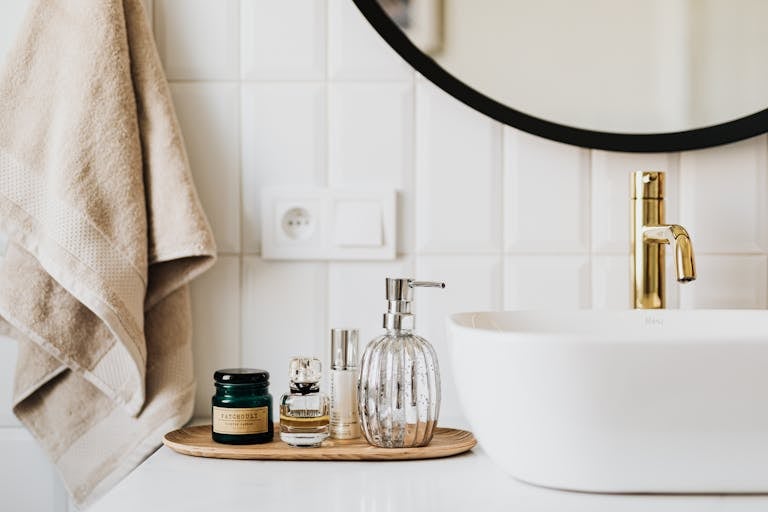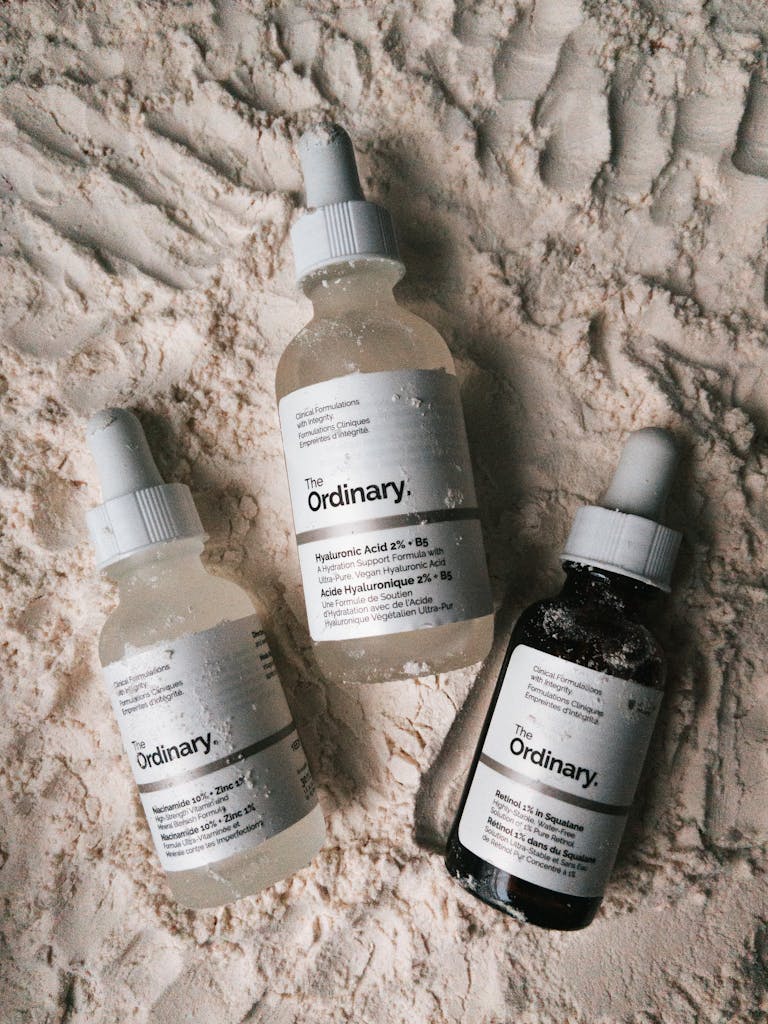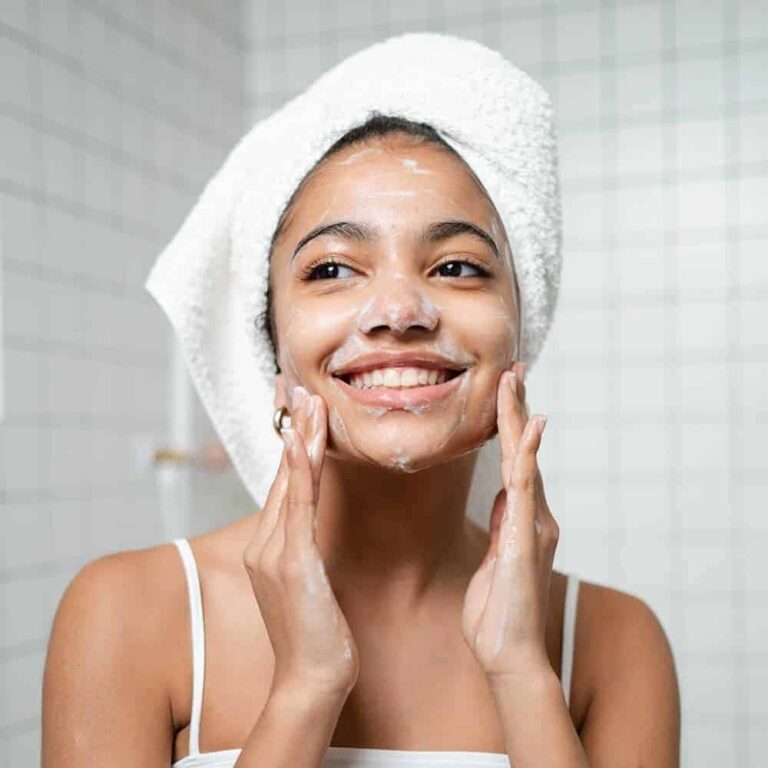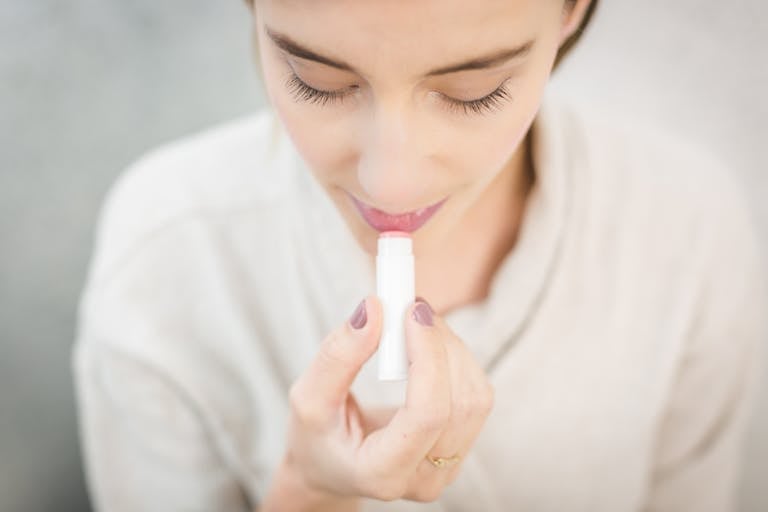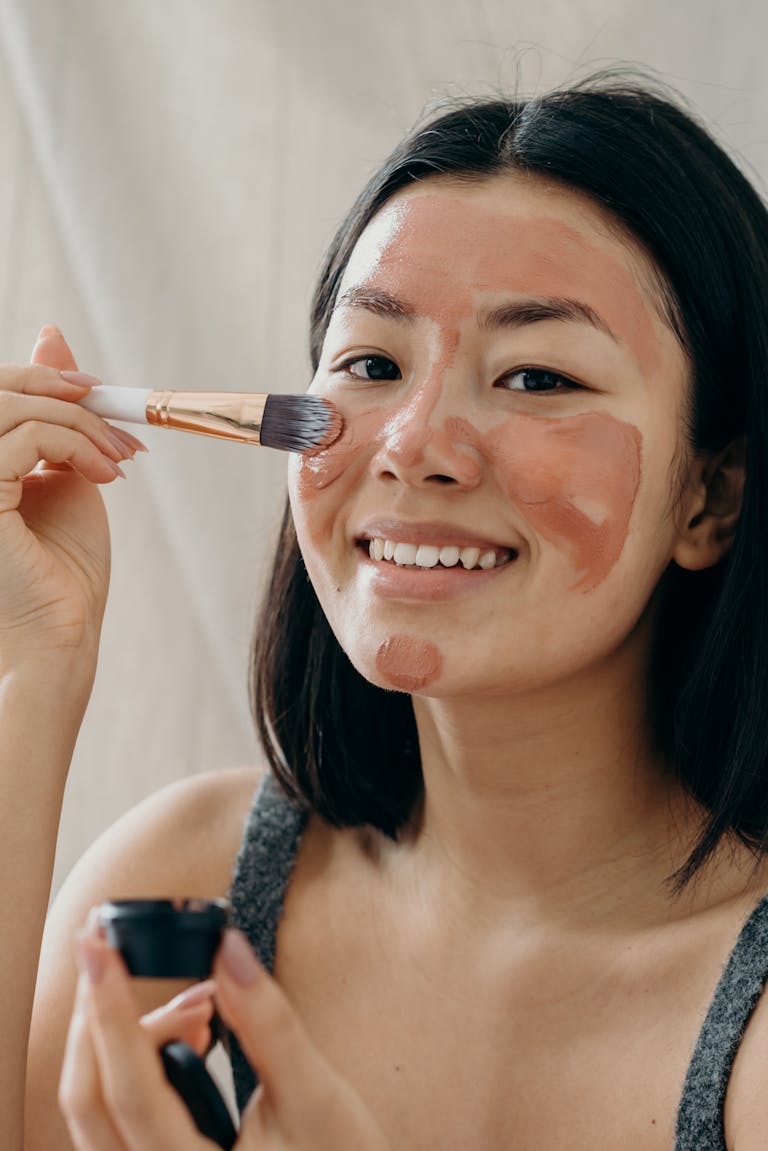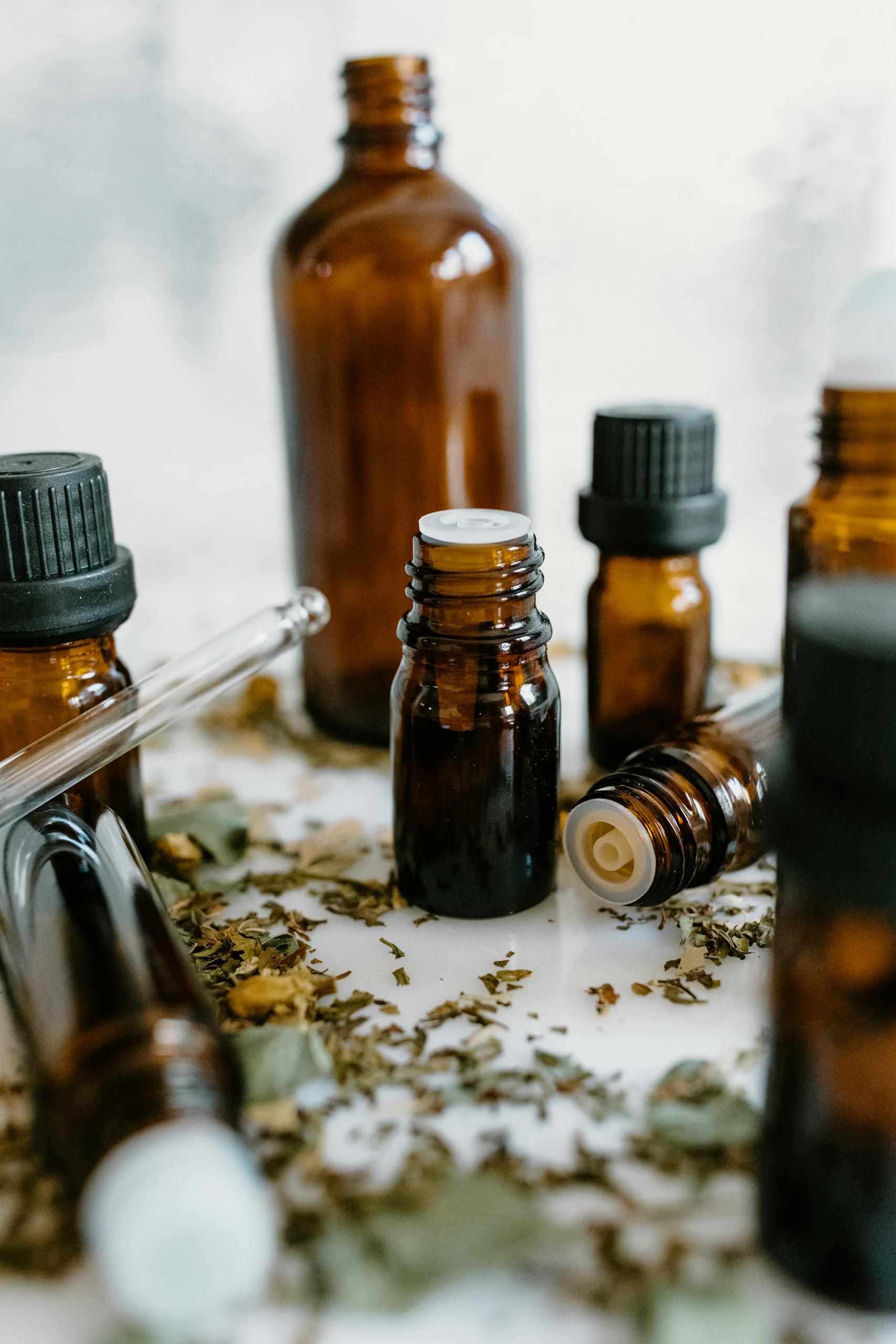
Struggling with acne can be frustrating, but nature offers some powerful allies in the form of essential oils. These concentrated plant extracts can help combat blemishes, reduce inflammation, and promote clearer skin. In this guide, we’ll explore the top 10 essential oils for acne and how to incorporate them into your skincare routine.
Why Use Essential Oils for Acne?
- Natural Antibacterial Properties: Many essential oils possess potent antibacterial qualities that can help combat acne-causing bacteria. For instance, tea tree oil has been shown to be effective against Propionibacterium acnes, the bacteria primarily responsible for acne. These natural antibacterial agents can work to cleanse the skin and prevent bacterial overgrowth without the harsh side effects often associated with synthetic antibacterial ingredients. This makes essential oils a gentler alternative for those with sensitive or reactive skin.
- Anti-inflammatory Effects: Acne is often accompanied by inflammation, which can lead to redness, swelling, and pain. Many essential oils, such as lavender and chamomile, have strong anti-inflammatory properties. These oils can help soothe irritated skin, reduce redness, and calm inflamed acne lesions. By addressing inflammation, essential oils not only help with the appearance of acne but can also alleviate discomfort associated with inflamed blemishes.
- Balancing Effect on Skin’s Oil Production: Some essential oils, like geranium and clary sage, have the ability to regulate sebum production in the skin. Excess sebum is a key factor in acne development, as it can clog pores and create an environment where acne-causing bacteria thrive. By helping to balance oil production, these essential oils can address one of the root causes of acne. This balancing effect can be particularly beneficial for those with combination or oily skin types.
- Gentle Compared to Harsh Chemical Treatments: Many conventional acne treatments contain strong chemicals like benzoyl peroxide or salicylic acid, which can be effective but may also cause dryness, irritation, or skin sensitivity. Essential oils offer a more natural and often gentler alternative. When used correctly, they can provide acne-fighting benefits without stripping the skin of its natural oils or causing excessive dryness. This gentler approach can be especially beneficial for those with sensitive skin or those who have experienced adverse reactions to traditional acne treatments.
- Multifaceted Skincare Benefits: Beyond their acne-fighting properties, many essential oils offer additional skincare benefits. For example, frankincense oil is known for its ability to promote cell regeneration, which can help with acne scarring. Lavender oil not only fights bacteria but also helps to reduce stress, which can be a contributing factor to acne breakouts. By choosing the right essential oils, you can address multiple skin concerns simultaneously, creating a more holistic skincare approach.
- Customisable Treatment: Essential oils allow for a high degree of customisation in your skincare routine. Different oils can be combined to create blends that address your specific skin concerns. For instance, you might combine tea tree oil for its antibacterial properties with lavender for soothing inflammation. This flexibility allows you to tailor your acne treatment to your skin’s unique needs, which can be more effective than a one-size-fits-all approach.
- Aromatherapeutic Benefits: Many essential oils used for acne treatment also offer aromatherapeutic benefits. The scents of these oils can have mood-enhancing and stress-reducing effects. Given that stress can be a trigger for acne breakouts, the calming aromatherapeutic properties of essential oils like lavender or ylang-ylang can indirectly support your acne treatment by promoting relaxation and reducing stress levels.
- Potential for Long-term Skin Health: While many conventional acne treatments focus on short-term symptom relief, essential oils can contribute to long-term skin health. Many of these oils are rich in antioxidants and nutrients that nourish the skin, improve its resilience, and support its natural healing processes. By improving overall skin health, essential oils may help prevent future breakouts and contribute to a clearer complexion over time.
Remember, while essential oils offer many benefits for acne-prone skin, they should be used carefully and in conjunction with a comprehensive skincare routine. Always dilute essential oils properly by using a carrier oil, perform patch tests, and consult with a skincare professional if you have any concerns about incorporating them into your regimen.
Top 10 Essential Oils for Acne
- Tea Tree Oil Benefits: Tea tree oil is renowned for its powerful antibacterial and anti-inflammatory properties. It effectively combats Propionibacterium acnes, the bacteria primarily responsible for acne. This essential oil penetrates deep into pores, helping to unclog them and reduce sebum buildup. Its anti-inflammatory action helps soothe redness and swelling associated with acne lesions. Tea tree oil also has the potential to regulate oil production, making it beneficial for oily and combination skin types. Studies have shown it to be as effective as benzoyl peroxide in treating mild to moderate acne, with fewer side effects. How to use: Mix 1-2 drops with a carrier oil and apply as a spot treatment
- Lavender Oil Benefits: Lavender oil is known for its soothing and healing properties. It has potent anti-inflammatory effects that can calm irritated skin and reduce redness associated with acne. This oil promotes skin cell regeneration, which can help in healing acne lesions and reducing the appearance of acne scars. Lavender oil also possesses mild antibacterial properties, contributing to its acne-fighting capabilities. Additionally, its stress-reducing aromatherapeutic properties may indirectly benefit acne-prone skin by helping to manage stress, a known trigger for acne breakouts. How to use: Add a few drops to your moisturiser or night cream
- Rosemary Oil Benefits: Rosemary oil is particularly beneficial for oily and acne-prone skin due to its ability to regulate sebum production. It has potent antimicrobial properties that help combat acne-causing bacteria. This essential oil also improves blood circulation when applied topically, which can promote healthier skin overall. Rosemary oil is rich in antioxidants, protecting the skin from free radical damage and potentially slowing signs of aging. Its astringent properties can help tighten pores, further benefiting oily skin types. How to use: Mix with witch hazel for a natural toner
- Frankincense Oil Benefits: Frankincense oil is prized for its ability to promote cell regeneration, making it excellent for reducing the appearance of acne scars. It has significant anti-inflammatory properties that help calm irritated skin and reduce redness associated with acne. This oil may help balance skin tone, fading dark spots left by acne. Frankincense oil also has astringent properties, which can help tighten skin and potentially reduce the appearance of large pores. Its gentle nature makes it suitable for most skin types, including sensitive skin. How to use: Blend with a carrier oil for a nourishing facial serum
- Oregano Oil Benefits: Oregano oil is known for its exceptionally strong antibacterial properties, making it highly effective against acne-causing bacteria. It contains high levels of thymol and carvacrol, compounds with powerful antimicrobial effects. This essential oil also has anti-inflammatory properties, helping to reduce swelling and redness associated with acne. Oregano oil can help dry out excess oil, making it particularly beneficial for very oily skin types. It’s also rich in antioxidants, which can protect the skin from free radical damage. How to use: Dilute heavily and use as a spot treatment (caution: very potent)
- Clary Sage Oil Benefits: Clary sage oil is particularly effective in balancing sebum production, making it ideal for both oily and combination skin types. It has natural antimicrobial properties that can help fight acne-causing bacteria. This essential oil also possesses anti-inflammatory qualities, which can reduce redness and swelling associated with acne breakouts. Clary sage is known for its potential to regulate hormones, which may be beneficial for hormonal acne. Additionally, it has a calming effect that can help reduce stress, a known contributor to acne flare-ups. How to use: Add to your facial steam for a deep cleanse
- Juniper Berry Oil Benefits: Juniper berry oil is valued for its detoxifying properties, which can help cleanse the skin of impurities that may lead to acne. It has strong antibacterial effects, making it effective against acne-causing bacteria. This oil also has astringent properties, which can help tighten pores and reduce excess oil production. Juniper berry oil contains natural anti-inflammatory compounds that can help soothe irritated skin and reduce the appearance of acne. Its antioxidant content may also help protect the skin from environmental damage and premature aging. How to use: Mix with a clay mask for a purifying treatment
- Lemongrass Oil Benefits: Lemongrass oil is known for its astringent properties, which can help unclog pores and reduce excess oil production. It has potent antimicrobial effects, making it effective in combating acne-causing bacteria. This essential oil also has anti-inflammatory properties that can help reduce redness and swelling associated with acne. Lemongrass oil may help improve skin tone and texture, promoting a more even complexion. Its fresh, citrusy scent can also have mood-lifting effects, which may indirectly benefit stress-related acne. How to use: Add to your cleanser or toner
- Geranium Oil Benefits: Geranium oil is excellent for balancing sebum production, making it suitable for all skin types, including combination and oily skin. It has natural antiseptic properties that can help fight acne-causing bacteria. This essential oil also promotes cell regeneration, which can aid in healing acne lesions and reducing the appearance of scars. Geranium oil has anti-inflammatory properties that can soothe irritated skin and reduce redness. It’s known to improve skin elasticity and may help in tightening pores, contributing to overall skin health. How to use: Mix with your moisturiser or facial oil
- Bergamot Oil Benefits: Bergamot oil is particularly effective in reducing the appearance of acne scars and evening out skin tone. It has natural antimicrobial properties that can help fight acne-causing bacteria. This essential oil may help control excess oil production, making it beneficial for oily and combination skin types. Bergamot oil contains natural compounds that can help cleanse and purify the skin. Its citrusy scent can have mood-lifting effects, which may be beneficial for stress-related acne. The oil is also rich in antioxidants, which can protect the skin from environmental damage and premature aging. How to use: Add to your body lotion for back or chest acne
As mentioned previously please remember, when using essential oils for acne, always dilute them properly with a carrier oil and perform a patch test before applying to larger areas of skin. If you have sensitive skin or are prone to allergies, consult with a dermatologist before incorporating essential oils into your skincare routine.

DIY Essential Oil Blends for Acne
Try these simple blends to target your acne concerns:
- Acne-Fighting Facial Oil:
- 2 drops Tea Tree oil
- 2 drops Lavender oil
- 1 drop Frankincense oil
- 1 tablespoon Jojoba oil
- Balancing Toner:
- 3 drops Rosemary oil
- 2 drops Geranium oil
- 1/4 cup Witch Hazel
- Scar-Reducing Serum:
- 2 drops Frankincense oil
- 2 drops Lavender oil
- 1 drop Bergamot oil
- 1 tablespoon Rosehip seed oil
Precautions When Using Essential Oils for Acne
- Dilution is Crucial: Essential oils for acne are highly concentrated and can cause skin irritation or even chemical burns if applied directly to the skin. Always dilute essential oils with a carrier oil (such as jojoba, coconut, or almond oil) before applying to your skin. A general rule is to use 2-3 drops of essential oil per teaspoon of carrier oil.
- Patch Testing: Before using any new essential oil on your face, perform a patch test. Apply a small amount of diluted oil to the inside of your wrist or elbow and wait 24 hours. If you experience any redness, itching, or irritation, do not use the oil on your face.
- Sun Sensitivity: Some essential oils for acne, particularly citrus oils like bergamot and lemon, can cause photosensitivity. This means your skin may be more sensitive to UV rays, potentially leading to sunburn or skin damage. If using these oils, avoid sun exposure for at least 12 hours after application, or use them only in your evening skincare routine.
- Pregnancy and Breastfeeding: If you’re pregnant or breastfeeding, consult with a healthcare professional before using essential oils for acne. Some oils may not be safe during these periods.
- Allergies and Sensitivities: If you have known allergies, particularly to plants, be cautious when trying new essential oils. For example, if you’re allergic to ragweed, you might react to chamomile oil.
- Avoid Ingestion: Essential oils are for external use only unless under the strict guidance of a qualified aromatherapist or healthcare provider. Ingesting essential oils can be dangerous.
- Keep Away from Eyes and Mucous Membranes: Avoid applying essential oils for acne near your eyes, inside your nose, or on other sensitive areas. If accidental contact occurs, flush the area with a carrier oil, not water, as oil and water don’t mix.
- Proper Storage: Store essential oils in dark glass bottles away from direct sunlight and heat to preserve their potency and prevent degradation.
- Quality Matters: Use high-quality, pure essential oils from reputable sources. Avoid synthetic fragrances or oils diluted with other substances.
- Don’t Overuse: More is not always better with essential oils for acne. Stick to recommended amounts and frequencies. Overuse can lead to skin irritation or sensitization.
- Consider Other Medications: If you’re taking any medications, check with your healthcare provider before using essential oils, as some can interact with medicines.
- Children and Pets: Use extra caution if you have children or pets in your home. Some oils can be toxic if ingested, and what’s safe for humans may not be safe for animals.
- Discontinue Use If Irritation Occurs: If you experience any adverse reactions such as rashes, increased acne, or skin irritation, stop using the essential oil immediately and consult a dermatologist if symptoms persist.
- Don’t Rely Solely on Essential Oils: While essential oils for acne can be beneficial, they should be part of a comprehensive skincare routine. Don’t neglect other important aspects like cleansing, moisturizing, and sun protection.
By following these precautions, you can safely harness the benefits of essential oils for acne treatment. Remember, everyone’s skin is different, so what works for one person may not work for another. Be patient, observant, and willing to adjust your routine as needed.
Complementary Practices for Acne-Prone Skin
While using essential oils for acne can be beneficial, it’s important to remember that clear skin comes from a holistic approach. Here are some complementary practices that can support your journey to healthier skin:
- Maintain a Consistent Skincare Routine: Consistency is key when it comes to managing acne-prone skin. Develop a routine that works for your skin type and stick to it. This typically includes:
- Gentle cleansing twice daily
- Toning to balance skin pH
- Targeted treatments for acne
- Moisturizing to maintain skin barrier health
- Sun protection during the day
Avoid over-cleansing or using harsh products, as these can strip the skin and potentially worsen acne.
- Stay Hydrated: Proper hydration is crucial for overall skin health. Aim to drink at least 8 glasses of water a day. Well-hydrated skin is better equipped to fight off acne-causing bacteria and heal existing blemishes. Consider keeping a water bottle with you throughout the day as a reminder to drink regularly.
- Eat a Balanced Diet: Your diet can significantly impact your skin health. Focus on:
- Fruits and vegetables rich in antioxidants
- Omega-3 fatty acids found in fish, flaxseeds, and walnuts
- Whole grains for balanced blood sugar levels
- Probiotic-rich foods like yogurt and kefir for gut health
Consider reducing your intake of dairy, sugar, and high-glycemic foods, as these have been linked to increased acne in some individuals.
- Manage Stress: Stress can trigger hormonal changes that lead to increased oil production and acne breakouts. Incorporate stress-management techniques into your daily routine, such as:
- Regular exercise (aim for at least 30 minutes a day)
- Meditation or mindfulness practices
- Deep breathing exercises
- Yoga or tai chi
- Engaging in hobbies or activities you enjoy
- Get Enough Sleep: Adequate sleep is crucial for skin health. During sleep, your body repairs and regenerates skin cells. Aim for 7-9 hours of quality sleep each night. Establish a relaxing bedtime routine and try to maintain consistent sleep and wake times.
- Keep Your Environment Clean: Pay attention to things that come into contact with your skin:
- Change pillowcases regularly (at least weekly)
- Clean your phone screen daily
- Wash makeup brushes and sponges weekly
- Avoid touching your face throughout the day
- Be Gentle with Your Skin: Avoid harsh scrubbing or picking at blemishes, as this can lead to inflammation and scarring. Instead, be gentle when cleansing and applying products.
By incorporating these complementary practices alongside your use of essential oils, you’re taking a comprehensive approach to managing acne-prone skin. Remember, everyone’s skin is unique, so you may need to experiment to find the combination of practices that works best for you.

When to See a Dermatologist
While many cases of acne can be managed with over-the-counter treatments and home remedies, there are situations where professional medical intervention is necessary. Here’s an expanded guide on when to consider seeing a dermatologist:
- Severity of Acne: If your acne is severe, characterized by deep, painful cysts or nodules, it’s time to see a dermatologist. This type of acne is more likely to cause scarring and may not respond well to over-the-counter treatments.
- Persistent Acne: If you’ve been consistently using over-the-counter treatments for 4-6 weeks with no improvement, it’s advisable to seek professional help. A dermatologist can offer stronger, prescription-strength treatments.
- Acne Scarring: If your acne is leaving scars or dark spots (post-inflammatory hyperpigmentation), a dermatologist can provide treatments to minimize scarring and improve skin texture.
- Sudden Onset of Severe Acne: If you experience a sudden outbreak of severe acne, especially as an adult, it could be a sign of an underlying health condition. A dermatologist can help identify any potential causes.
- Hormonal Acne: If your acne seems to be related to hormonal changes (e.g., flare-ups around your menstrual cycle), a dermatologist can offer treatments specifically targeted at hormonal acne.
- Acne Affecting Your Quality of Life: If acne is causing emotional distress, affecting your self-esteem, or impacting your social life, don’t hesitate to seek professional help. Dermatologists understand the psychological impact of skin conditions.
- Acne in Unusual Locations: If you’re experiencing acne in atypical areas like your armpit, groin, or under your breasts, it’s worth getting checked out as this could indicate a different skin condition.
- Acne That Doesn’t Respond to Treatment: If you’ve tried multiple over-the-counter treatments and nothing seems to work, a dermatologist can offer more potent options or identify if there’s an underlying cause.
- Acne Accompanied by Other Symptoms: If your acne is accompanied by other symptoms like excessive hair growth, irregular periods, or weight gain, it could be a sign of a hormonal disorder like PCOS. A dermatologist can help diagnose or refer you to an appropriate specialist.
- Family History of Severe Acne: If you have a family history of severe acne or cystic acne, seeing a dermatologist early can help prevent serious outbreaks and potential scarring.
- Acne During Pregnancy: If you’re pregnant and experiencing acne, it’s important to consult a dermatologist as many common acne treatments are not safe during pregnancy.
- Acne in Older Adults: If you’re experiencing acne as an older adult, especially if you didn’t have acne as a teenager, it’s worth getting checked out as it could be a sign of an underlying condition.
- Rapidly Spreading Acne: If your acne is spreading rapidly to different parts of your body, a dermatologist should evaluate it.
- Acne That’s Resistant to Antibiotics: If you’ve been prescribed antibiotics for acne in the past and they’re no longer effective, a dermatologist can offer alternative treatments.
- Desire for Professional Guidance: Even if your acne isn’t severe, you might simply want professional advice on how to best care for your skin. Dermatologists can provide personalized skincare plans and recommendations.
Remember, early intervention can prevent more serious skin issues down the line. Dermatologists are trained to handle a wide range of skin conditions and can offer treatments that aren’t available over the counter. They can also help identify if your acne is a symptom of a larger health issue.
Don’t let embarrassment or the belief that acne is just a cosmetic issue prevent you from seeking help. Clear, healthy skin is an important part of overall health and well-being, and professional help is available if you need it.
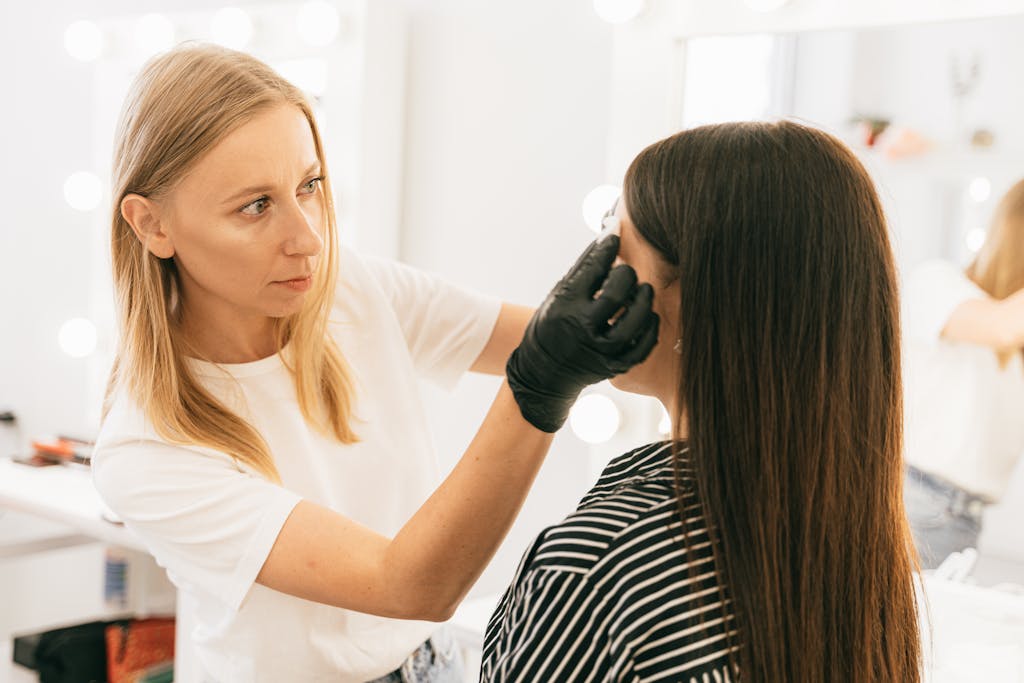
Conclusion
Essential oils for acne can be a powerful addition to your skincare routine. With their natural antibacterial and anti-inflammatory properties, they offer a gentle yet effective approach to managing acne-prone skin. Remember to always use essential oils safely, be patient, and combine their use with a healthy lifestyle for the best results.
However, it’s crucial to recognize that while natural remedies can be effective, they’re not always the complete solution for everyone. If you’ve been struggling with persistent or severe acne, don’t hesitate to seek professional help. Seeing a dermatologist is not something to be scared or ashamed of – it’s a proactive step towards healthier skin and greater well-being.
Remember, acne is a medical condition, not a reflection of personal hygiene or worth. Many people, including celebrities and skin care experts, rely on dermatologists to maintain healthy skin. Seeking professional help doesn’t mean you’ve failed at managing your skin – it means you’re taking your skin health seriously.
Moreover, early intervention by a dermatologist can prevent more severe acne, reduce the risk of scarring, and save you time and money in the long run. They can also address any underlying health issues that might be contributing to your acne.
So, while incorporating essential oils and natural remedies into your skincare routine can be beneficial, don’t let fear or stigma prevent you from seeking professional help if you need it. Your journey to clear, healthy skin might involve a combination of natural remedies, over-the-counter products, and professional treatments – and that’s perfectly okay.
Embrace all the tools available to you, from essential oils for acne to dermatological expertise. Your skin deserves the best care possible, and there’s no shame in utilizing every resource at your disposal to achieve the healthy, glowing complexion you desire.

